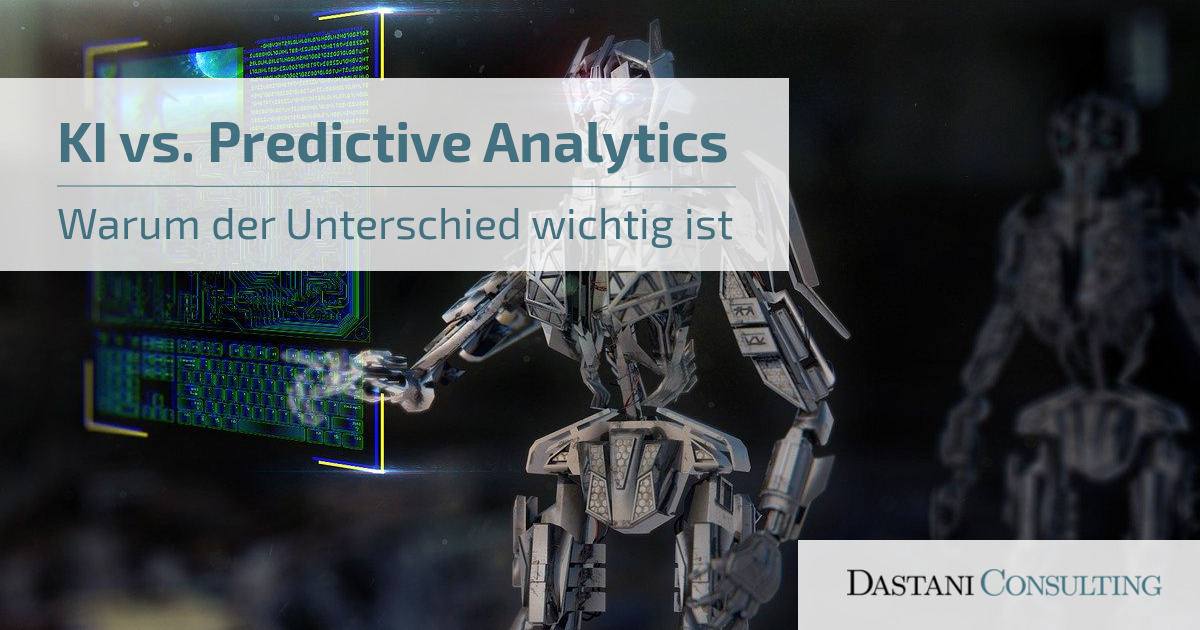
Predictive analytics and AI are two terms that are used more and more frequently. These innovative technologies and digital tools are revolutionizing companies across industries and sectors. From automated processes to individual target customer approach in marketing to data-driven use in sales to target new customers with appropriate offers. Both terms are often used interchangeably and are practically synonymous.
The latest features that are on the rise in the field of information management are defined as Predictive Analytics or AI (Artificial Intelligence/Machine Learning). The era of AI is just beginning in many companies with the use of the many possibilities of Predictive Analytics, which are listed in this article for some cases. Furthermore you will read what you need to know about AI and Predictive Analytics and how they differ.
Definition: Predictive Analytics
Predictive analytics uses historical data to predict future events. Typically, historical data is used to create a mathematical model to capture key trends. This predictive model can then be used for current data to project what will happen next. At the same time, however, measures can also be proposed to achieve an optimal outcome.
Based on the achieved outcome, companies can gain deeper insights into trends and patterns regarding their employees, customers and competitors in the market. Where risks can be mitigated, success and certainty for predictions can be gained at the same time. Current data from various channels, including emails, files, CRM applications, relational databases, social media, and more, is collected and analyzed.
Due to increasing competition, companies are looking for advantages to offer products and services in crowded markets. Using such data-driven forecasting models can help companies achieve more positive business results and solve long-standing problems.
How AI differs
AI has existed for quite a long time, but machine learning is actually being developed.
Machine learning – an AI technique – counts as a continuation of the concepts of predictive analytics, but with one major difference: the AI system can make assumptions, test and learn by itself. AI is a combination of several technologies, and machine learning is considered one of the best known techniques for gaining deep data insight.
In machine learning, algorithms are „fed“ with data and then asked to process this data with prescribed rules. Predictive analytics is the analysis of historical and existing external data to reveal patterns and relationships.
Machine learning works by combining large amounts of data with iterative processing and intelligent algorithms so that the software automatically learns from patterns and relationships in the data.
Different application scenarios
A practical example of predictive analytics vs. AI is online retailers. They use the search and buying habits of their customers to predict the next likely purchase of a customer (Next Best Offer). Based on the prediction, ads and promotional e-mails with suitable products and services can then be placed for the potential customer.
Predictive analytics can also help to avoid churn in the customer base by identifying the customer segments that pose the greatest risk of leaving (churn prediction). Based on this information, appropriate measures can be taken in time to satisfy the customer.
In addition, predictive analytics enables marketing to be optimized in order to attract or retain the customers that offer the greatest life cycle for a company (customer value prediction).
Predictive analytics can also provide suggestions as to which products or services can be combined to increase customer value and revenue opportunities (up- and cross-selling offers).
If you have any further questions, please visit our social media channels (Xing, Linkedin, Instagram) call us at +49 (0)641 984 46 – 0.
